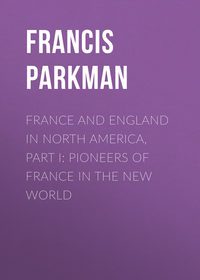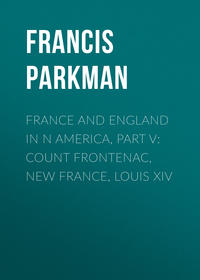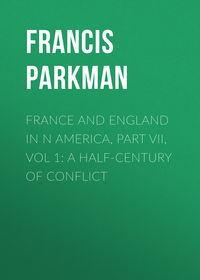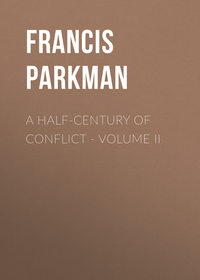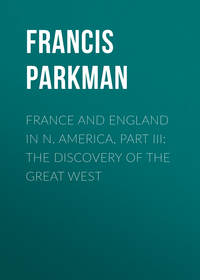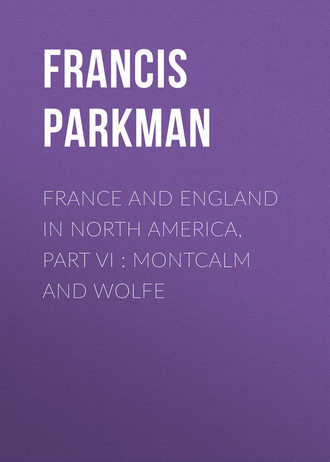 полная версия
полная версияFrance and England in North America, Part VI : Montcalm and Wolfe
They had acted with their usual promptness. Their Governor, a practised soldier, knew the value of celerity, and had set his troops in motion with the first opening of spring. He had no refractory assembly to hamper him; no lack of money, for the King supplied it; and all Canada must march at his bidding. Thus, while Dinwiddie was still toiling to muster his raw recruits, Duquesne's lieutenant, Contrecœur, successor of Saint-Pierre, had landed at Presquisle with a much greater force, in part regulars, and in part Canadians.
Dinwiddie was deeply vexed when a message from Washington told him how his plans were blighted; and he spoke his mind to his friend Hanbury: "If our Assembly had voted the money in November which they did in February, it's more than probable the fort would have been built and garrisoned before the French had approached; but these things cannot be done without money. As there was none in our treasury, I have advanced my own to forward the expedition; and if the independent companies from New York come soon, I am in hopes the eyes of the other colonies will be opened; and if they grant a proper supply of men, I hope we shall be able to dislodge the French or build a fort on that river. I congratulate you on the increase of your family. My wife and two girls join in our most sincere respects to good Mrs. Hanbury."146
The seizure of a king's fort by planting cannon against it and threatening it with destruction was in his eyes a beginning of hostilities on the part of the French; and henceforth both he and Washington acted much as if war had been declared. From their station at Wills Creek, the distance by the traders' path to Fort Duquesne was about a hundred and forty miles. Midway was a branch of the Monongahela called Redstone Creek, at the mouth of which the Ohio Company had built another storehouse. Dinwiddie ordered all the forces to cross the mountains and assemble at this point, until they should be strong enough to advance against the French. The movement was critical in presence of an enemy as superior in discipline as he was in numbers, while the natural obstacles were great. A road for cannon and wagons must be cut through a dense forest and over two ranges of high mountains, besides countless hills and streams. Washington set all his force to the work, and they spent a fortnight in making twenty miles. Towards the end of May, however, Dinwiddie learned that he had crossed the main ridge of the Alleghanies, and was encamped with a hundred and fifty men near the parallel ridge of Laurel Hill, at a place called the Great Meadows. Trent's backwoodsmen had gone off in disgust; Fry, with the rest of the regiment, was still far behind; and Washington was daily expecting an attack. Close upon this, a piece of good news, or what seemed such, came over the mountains and gladdened the heart of the Governor. He heard that a French detachment had tried to surprise Washington, and that he had killed or captured the whole. The facts were as follows.
Washington was on the Youghiogany, a branch of the Monongahela, exploring it in hopes that it might prove navigable, when a messenger came to him from his old comrade, the Half-King, who was on the way to join him. The message was to the effect that the French had marched from their fort, and meant to attack the first English they should meet. A report came soon after that they were already at the ford of the Youghiogany, eighteen miles distant. Washington at once repaired to the Great Meadows, a level tract of grass and bushes, bordered by wooded hills, and traversed in one part by a gully, which with a little labor the men turned into an entrenchment, at the same time cutting away the bushes and clearing what the young commander called "a charming field for an encounter." Parties were sent out to scour the woods, but they found no enemy. Two days passed; when, on the morning of the twenty-seventh, Christopher Gist, who had lately made a settlement on the farther side of Laurel Hill, twelve or thirteen miles distant, came to the camp with news that fifty Frenchmen had been at his house towards noon of the day before, and would have destroyed everything but for the intervention of two Indians whom he had left in charge during his absence. Washington sent seventy-five men to look for the party; but the search was vain, the French having hidden themselves so well as to escape any eye but that of an Indian. In the evening a runner came from the Half-King, who was encamped with a few warriors some miles distant. He had sent to tell Washington that he had found the tracks of two men, and traced them towards a dark glen in the forest, where in his belief all the French were lurking.
Washington seems not to have hesitated a moment. Fearing a stratagem to surprise his camp, he left his main force to guard it, and at ten o'clock set out for the Half-King's wigwams at the head of forty men. The night was rainy, and the forest, to use his own words, "as black as pitch." "The path," he continues, "was hardly wide enough for one man; we often lost it, and could not find it again for fifteen or twenty minutes, and we often tumbled over each other in the dark."147 Seven of his men were lost in the woods and left behind. The rest groped their way all night, and reached the Indian camp at sunrise. A council was held with the Half-King, and he and his warriors agreed to join in striking the French. Two of them led the way. The tracks of the two French scouts seen the day before were again found, and, marching in single file, the party pushed through the forest into the rocky hollow where the French were supposed to be concealed. They were there in fact; and they snatched their guns the moment they saw the English. Washington gave the word to fire. A short fight ensued. Coulon de Jumonville, an ensign in command, was killed, with nine others; twenty-two were captured, and none escaped but a Canadian who had fled at the beginning of the fray. After it was over, the prisoners told Washington that the party had been sent to bring him a summons from Contrecœur, the commandant at Fort Duquesne.
Five days before, Contrecœur had sent Jumonville to scour the country as far as the dividing ridge of the Alleghanies. Under him were another officer, three cadets, a volunteer, an interpreter, and twenty-eight men. He was provided with a written summons, to be delivered to any English he might find. It required them to withdraw from the domain of the King of France, and threatened compulsion by force of arms in case of refusal. But before delivering the summons Jumonville was ordered to send two couriers back with all speed to Fort Duquesne to inform the commandant that he had found the English, and to acquaint him when he intended to communicate with them.148 It is difficult to imagine any object for such an order except that of enabling Contrecœur to send to the spot whatever force might be needed to attack the English on their refusal to withdraw. Jumonville had sent the two couriers, and had hidden himself, apparently to wait the result. He lurked nearly two days within five miles of Washington's camp, sent out scouts to reconnoitre it, but gave no notice of his presence; played to perfection the part of a skulking enemy, and brought destruction on himself by conduct which can only be ascribed to a sinister motive on the one hand, or to extreme folly on the other. French deserters told Washington that the party came as spies, and were to show the summons only if threatened by a superior force. This last assertion is confirmed by the French officer Pouchot, who says that Jumonville, seeing himself the weaker party, tried to show the letter he had brought.149
French writers say that, on first seeing the English, Jumonville's interpreter called out that he had something to say to them; but Washington, who was at the head of his men, affirms this to be absolutely false. The French say further that Jumonville was killed in the act of reading the summons. This is also denied by Washington, and rests only on the assertion of the Canadian who ran off at the outset, and on the alleged assertion of Indians who, if present at all, which is unlikely, escaped like the Canadian before the fray began. Druillon, an officer with Jumonville, wrote two letters to Dinwiddie after his capture, to claim the privileges of the bearer of a summons; but while bringing forward every other circumstance in favor of the claim, he does not pretend that the summons was read or shown either before or during the action. The French account of the conduct of Washington's Indians is no less erroneous. "This murder," says a chronicler of the time, "produced on the minds of the savages an effect very different from that which the cruel Washington had promised himself. They have a horror of crime; and they were so indignant at that which had just been perpetrated before their eyes, that they abandoned him, and offered themselves to us in order to take vengeance."150 Instead of doing this, they boasted of their part in the fight, scalped all the dead Frenchmen, sent one scalp to the Delawares as an invitation to take up the hatchet for the English, and distributed the rest among the various Ohio tribes to the same end.
Coolness of judgment, a profound sense of public duty, and a strong self-control, were even then the characteristics of Washington; but he was scarcely twenty-two, was full of military ardor, and was vehement and fiery by nature. Yet it is far from certain that, even when age and experience had ripened him, he would have forborne to act as he did, for there was every reason for believing that the designs of the French were hostile; and though by passively waiting the event he would have thrown upon them the responsibility of striking the first blow, he would have exposed his small party to capture or destruction by giving them time to gain reinforcements from Fort Duquesne. It was inevitable that the killing of Jumonville should be greeted in France by an outcry of real or assumed horror; but the Chevalier de Lévis, second in command to Montcalm, probably expresses the true opinion of Frenchmen best fitted to judge when he calls it "a pretended assassination."151 Judge it as we may, this obscure skirmish began the war that set the world on fire.152
Washington returned to the camp at the Great Meadows; and, expecting soon to be attacked, sent for reinforcements to Colonel Fry, who was lying dangerously ill at Wills Creek. Then he set his men to work at an entrenchment, which he named Fort Necessity, and which must have been of the slightest, as they finished it within three days.153 The Half-King now joined him, along with the female potentate known as Queen Alequippa, and some thirty Indian families. A few days after, Gist came from Wills Creek with news that Fry was dead. Washington succeeded to the command of the regiment, the remaining three companies of which presently appeared and joined their comrades, raising the whole number to three hundred. Next arrived the independent company from South Carolina; and the Great Meadows became an animated scene, with the wigwams of the Indians, the camp-sheds of the rough Virginians, the cattle grazing on the tall grass or drinking at the lazy brook that traversed it; the surrounding heights and forests; and over all, four miles away, the lofty green ridge of Laurel Hill.
The presence of the company of regulars was a doubtful advantage. Captain Mackay, its commander, holding his commission from the King, thought himself above any officer commissioned by the Governor. There was great courtesy between him and Washington; but Mackay would take no orders, nor even the countersign, from the colonel of volunteers. Nor would his men work, except for an additional shilling a day. To give this was impossible, both from want of money, and from the discontent it would have bred in the Virginians, who worked for nothing besides their daily pay of eightpence. Washington, already a leader of men, possessed himself in a patience extremely difficult to his passionate temper; but the position was untenable, and the presence of the military drones demoralized his soldiers. Therefore, leaving Mackay at the Meadows, he advanced towards Gist's settlement, cutting a wagon road as he went.
On reaching the settlement the camp was formed and an entrenchment thrown up. Deserters had brought news that strong reinforcements were expected at Fort Duquesne, and friendly Indians repeatedly warned Washington that he would soon be attacked by overwhelming numbers. Forty Indians from the Ohio came to the camp, and several days were spent in councils with them; but they proved for the most part to be spies of the French. The Half-King stood fast by the English, and sent out three of his young warriors as scouts. Reports of attack thickened. Mackay and his men were sent for, and they arrived on the twenty-eighth of June. A council of war was held at Gist's house; and as the camp was commanded by neighboring heights, it was resolved to fall back. The horses were so few that the Virginians had to carry much of the baggage on their backs, and drag nine swivels over the broken and rocky road. The regulars, though they also were raised in the provinces, refused to give the slightest help. Toiling on for two days, they reached the Great Meadows on the first of July. The position, though perhaps the best in the neighborhood, was very unfavorable, and Washington would have retreated farther, but for the condition of his men. They were spent with fatigue, and there was no choice but to stay and fight.
Strong reinforcements had been sent to Fort Duquesne in the spring, and the garrison now consisted of about fourteen hundred men. When news of the death of Jumonville reached Montreal, Coulon de Villiers, brother of the slain officer, was sent to the spot with a body of Indians from all the tribes in the colony. He made such speed that at eight o'clock on the morning of the twenty-sixth of June he reached the fort with his motley following. Here he found that five hundred Frenchmen and a few Ohio Indians were on the point of marching against the English, under Chevalier Le Mercier; but in view of his seniority in rank and his relationship to Jumonville, the command was now transferred to Villiers. Hereupon, the march was postponed; the newly-arrived warriors were called to council, and Contrecœur thus harangued them: "The English have murdered my children, my heart is sick; to-morrow I shall send my French soldiers to take revenge. And now, men of the Saut St. Louis, men of the Lake of Two Mountains, Hurons, Abenakis, Iroquois of La Présentation, Nipissings, Algonquins, and Ottawas,—I invite you all by this belt of wampum to join your French father and help him to crush the assassins. Take this hatchet, and with it two barrels of wine for a feast." Both hatchet and wine were cheerfully accepted. Then Contrecœur turned to the Delawares, who were also present: "By these four strings of wampum I invite you, if you are true children of Onontio, to follow the example of your brethren;" and with some hesitation they also took up the hatchet.
The next day was spent by the Indians in making moccasons for the march, and by the French in preparing for an expedition on a larger scale than had been at first intended. Contrecœur, Villiers, Le Mercier, and Longueuil, after deliberating together, drew up a paper to the effect that "it was fitting (convenable) to march against the English with the greatest possible number of French and savages, in order to avenge ourselves and chastise them for having violated the most sacred laws of civilized nations;" that, thought their conduct justified the French in disregarding the existing treaty of peace, yet, after thoroughly punishing them, and compelling them to withdraw from the domain of the King, they should be told that, in pursuance of his royal orders, the French looked on them as friends. But it was further agreed that should the English have withdrawn to their own side of the mountains, "they should be followed to their settlements to destroy them and treat them as enemies, till that nation should give ample satisfaction and completely change its conduct."154
The party set out on the next morning, paddled their canoes up the Monongahela, encamped, heard Mass; and on the thirtieth reached the deserted storehouse of the Ohio Company at the mouth of Redstone Creek. It was a building of solid logs, well loopholed for musketry. To please the Indians by asking their advice, Villiers called all the chiefs to council; which, being concluded to their satisfaction, he left a sergeant's guard at the storehouse to watch the canoes, and began his march through the forest. The path was so rough that at the first halt the chaplain declared he could go no farther, and turned back for the storehouse, though not till he had absolved the whole company in a body. Thus lightened of their sins, they journeyed on, constantly sending out scouts. On the second of July they reached the abandoned camp of Washington at Gist's settlement; and here they bivouacked, tired, and drenched all night by rain. At daybreak they marched again, and passed through the gorge of Laurel Hill. It rained without ceasing; but Villiers pushed his way through the dripping forest to see the place, half a mile from the road, where his brother had been killed, and where several bodies still lay unburied. They had learned from a deserter the position of the enemy, and Villiers filled the woods in front with a swarm of Indian scouts. The crisis was near. He formed his men in column, and ordered every officer to his place.
Washington's men had had a full day at Fort Necessity; but they spent it less in resting from their fatigue than in strengthening their rampart with logs. The fort was a simple square enclosure, with a trench said by a French writer to be only knee deep. On the south, and partly on the west, there was an exterior embankment, which seems to have been made, like a rifle-pit, with the ditch inside. The Virginians had but little ammunition, and no bread whatever, living chiefly on fresh beef. They knew the approach of the French, who were reported to Washington as nine hundred strong, besides Indians. Towards eleven o'clock a wounded sentinel came in with news that they were close at hand; and they presently appeared at the edge of the woods, yelling, and firing from such a distance that their shot fell harmless. Washington drew up his men on the meadow before the fort, thinking, he says, that the enemy, being greatly superior in force, would attack at once; and choosing for some reason to meet them on the open plain. But Villiers had other views. "We approached the English," he writes, "as near as possible, without uselessly exposing the lives of the King's subjects;" and he and his followers made their way through the forest till they came opposite the fort, where they stationed themselves on two densely wooded hills, adjacent, though separated by a small brook. One of these was about a hundred paces from the English, and the other about sixty. Their position was such that the French and Indians, well sheltered by trees and bushes, and with the advantage of higher ground, could cross their fire upon the fort and enfilade a part of it. Washington had meanwhile drawn his followers within the entrenchment; and the firing now began on both sides. Rain fell all day. The raw earth of the embankment was turned to soft mud, and the men in the ditch of the outwork stood to the knee in water. The swivels brought back from the camp at Gist's farm were mounted on the rampart; but the gunners were so ill protected that the pieces were almost silenced by the French musketry. The fight lasted nine hours. At times the fire on both sides was nearly quenched by the showers, and the bedrenched combatants could do little but gaze at each other through a gray veil of mist and rain. Towards night, however, the fusillade revived, and became sharp again until dark. At eight o'clock the French called out to propose a parley.
Villiers thus gives his reason for these overtures. "As we had been wet all day by the rain, as the soldiers were very tired, as the savages said that they would leave us the next morning, and as there was a report that drums and the firing of cannon had been heard in the distance, I proposed to M. Le Mercier to offer the English a conference." He says further that ammunition was falling short, and that he thought the enemy might sally in a body and attack him.155 The English, on their side, were in a worse plight. They were half starved, their powder was nearly spent, their guns were foul, and among them all they had but two screw-rods to clean them. In spite of his desperate position, Washington declined the parley, thinking it a pretext to introduce a spy; but when the French repeated their proposal and requested that he would send an officer to them, he could hesitate no longer. There were but two men with him who knew French, Ensign Peyroney, who was disabled by a wound, and the Dutchman, Captain Vanbraam. To him the unpalatable errand was assigned. After a long absence he returned with articles of capitulation offered by Villiers; and while the officers gathered about him in the rain, he read and interpreted the paper by the glimmer of a sputtering candle kept alight with difficulty. Objection was made to some of the terms, and they were changed. Vanbraam, however, apparently anxious to get the capitulation signed and the affair ended, mistranslated several passages, and rendered the words l'assassinat du Sieur de Jumonville as the death of the Sieur de Jumonville.156 As thus understood, the articles were signed about midnight. They provided that the English should march out with drums beating and the honors of war, carrying with them one of their swivels and all their other property; that they should be protected against insult from French or Indians; that the prisoners taken in the affair of Jumonville should be set free; and that two officers should remain as hostages for their safe return to Fort Duquesne. The hostages chosen were Vanbraam and a brave but eccentric Scotchman, Robert Stobo, an acquaintance of the novelist Smollett, said to be the original of his Lismahago.
Washington reports that twelve of the Virginians were killed on the spot, and forty-three wounded, while on the casualties in Mackay's company no returns appear. Villiers reports his own loss at only twenty in all.157 The numbers engaged are uncertain. The six companies of the Virginia regiment counted three hundred and five men and officers, and Mackay's company one hundred; but many were on the sick list, and some had deserted. About three hundred and fifty may have taken part in the fight. On the side of the French, Villiers says that the detachment as originally formed consisted of five hundred white men. These were increased after his arrival at Fort Duquesne, and one of the party reports that seven hundred marched on the expedition.158 The number of Indians joining them is not given; but as nine tribes and communities contributed to it, and as two barrels of wine were required to give the warriors a parting feast, it must have been considerable. White men and red, it seems clear that the French force was more than twice that of the English, while they were better posted and better sheltered, keeping all day under cover, and never showing themselves on the open meadow. There were no Indians with Washington. Even the Half-King held aloof; though, being of a caustic turn, he did not spare his comments on the fight, telling Conrad Weiser, the provincial interpreter, that the French behaved like cowards, and the English like fools.159
In the early morning the fort was abandoned and the retreat began. The Indians had killed all the horses and cattle, and Washington's men were so burdened with the sick and wounded, whom they were obliged to carry on their backs, that most of the baggage was perforce left behind. Even then they could march but a few miles, and then encamped to wait for wagons. The Indians increased the confusion by plundering, and threatening an attack. They knocked to pieces the medicine-chest, thus causing great distress to the wounded, two of whom they murdered and scalped. For a time there was danger of panic; but order was restored, and the wretched march began along the forest road that led over the Alleghanies, fifty-two miles to the station at Wills Creek. Whatever may have been the feelings of Washington, he has left no record of them. His immense fortitude was doomed to severer trials in the future; yet perhaps this miserable morning was the darkest of his life. He was deeply moved by sights of suffering; and all around him were wounded men borne along in torture, and weary men staggering under the living load. His pride was humbled, and his young ambition seemed blasted in the bud. It was the fourth of July. He could not foresee that he was to make that day forever glorious to a new-born nation hailing him as its father.


